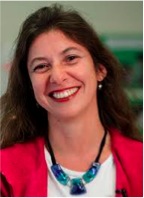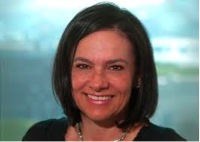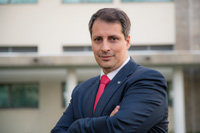 Marina Umaschi Bers is a professor at the Eliot-Pearson Department of Child Study and Human Development and an adjunct professor in the Computer Science Department at Tufts University. She heads the interdisciplinary Developmental Technologies research group. Her research involves the design and study of innovative learning technologies to promote children’s positive development.
Marina Umaschi Bers is a professor at the Eliot-Pearson Department of Child Study and Human Development and an adjunct professor in the Computer Science Department at Tufts University. She heads the interdisciplinary Developmental Technologies research group. Her research involves the design and study of innovative learning technologies to promote children’s positive development.
Prof. Umaschi Bers is from Argentina, where she did her undergraduate studies in Social Communication at Buenos Aires University. In 1994 she came to the US where she received a Master’s degree in Educational Media and Technology from Boston University and a Master of Science and PhD from the MIT Media Laboratory working with Seymour Papert. Prof. Umaschi Bers has three children.
Prof. Umaschi Bers received prestigious awards such as the 2005 Presidential Early Career Award for Scientists and Engineers (PECASE), the highest honor given by the U.S. government to outstanding investigators at the early stages of their careers, a National Science Foundation (NSF)'s Young Investigator’s Career Award,for her work on virtual communities of learning and care, and the American Educational Research Association (AERA) Jan Hawkins Award for Early Career Contributions to Humanistic Research and Scholarship in Learning Technologies.She was also selected by the Boston Business Journal as one of the recipients of its 2015 Women to Watch in Science and Technology awards.
Since the mid 90’s, Prof. Umaschi Bers has conceived and designed diverse technological tools ranging from robotics to virtual worlds. Her recent research focuses on how new technologies such as robotics and programming languages, that extend the possibilities of traditional learning manipulatives, can be successfully used to promote math, science, technology and engineering education in early childhood alongside with socio-emotional development and the arts. For example, she co-developed the ScratchJr programming language in collaboration with Mitch Resnick from the MIT Media Lab and Paula Bonta, from the PICO company. ScratchJr is a free app funded by the National Science Foundation, the Code to Learn Foundation and a very successful Kickstarter campaign.
Prof. Umaschi Bers also developed the KIBO robot kit for children 4 to 7 year old, that can be programmed with wooden blocks without using keyboards or screens old and co-founded a start-up, KinderLab Robotics, Inc that with funding from the National Science Foundation SBIR program, is commercializing KIBO and making available worldwide.
Prof. Umaschi Bers is passionate about using the power of technology to promote positive development and learning for young children. Check out her 2014 TEDx talk “Young programmers — think playgrounds, not playpens”.
Prof. Umaschi Bers teaches seminars and professional development institutes on learning technologies for early childhood educators and does consulting for toy companies and educational organizations that want to take advantage of the power of new technologies for young children. She has conducted studies and done work in after school programs, museums and hospitals, as well as schools and preschools. She has worked in the US, Argentina, Colombia, Spain, Costa Rica, Singapore and Thailand.
 Claudia Urrea has over 20 years of experience in the field of Education and Technology. Claudia Urrea is currently working at the Strategic Educational Initiative within the MIT Office of Digital Learning in strategy, management and coordination for the new PreK-12 Initiative. Claudia Urrea has worked at the Interamerican Development Bank as a consultant in the Education Sector, and 5 years at One Laptop Per Child organization as Director of Learning. Her areas of interest include online learning and assessment, curriculum design, preK-12 and higher education, education for developing countries, teacher professional development, educational programming and robotics, and maker education.
Claudia Urrea has over 20 years of experience in the field of Education and Technology. Claudia Urrea is currently working at the Strategic Educational Initiative within the MIT Office of Digital Learning in strategy, management and coordination for the new PreK-12 Initiative. Claudia Urrea has worked at the Interamerican Development Bank as a consultant in the Education Sector, and 5 years at One Laptop Per Child organization as Director of Learning. Her areas of interest include online learning and assessment, curriculum design, preK-12 and higher education, education for developing countries, teacher professional development, educational programming and robotics, and maker education.
Claudia Urrea was born in Colombia, where she received an undergraduate degree in Computer Science from EAFIT University. In the mid 90s, she moved to the US, where she received her Master's degree in Educational Media and Technology from Boston University, and her doctorate degree from the MIT Media Laboratory. Her PhD thesis studied the implications of one to one learning in a rural setting in Latin America. She has helped multiple governments and non-government agencies to empower and support schools and communities of learners to evolve from traditional teaching methods into progressive learning environments.
Dr. Urrea has also a research scientist position with the Lifelong Kindergarten group at the MIT Media Lab. She has taught several classes at the Harvard Summer Program and Early Childhood Development program at Tufts University. She has consulted with international and multi-sectoral organizations such as the Inter-American Development Bank and Schlumberger Excellence in Education Development-SEED.
 Jose Carlos Quadrado, is an international leader in engineering education. He is a full-professor at the Instituto Politecnico do Porto (IPP), one of the leading and most prestigious engineering institutes in Portugal.
Jose Carlos Quadrado, is an international leader in engineering education. He is a full-professor at the Instituto Politecnico do Porto (IPP), one of the leading and most prestigious engineering institutes in Portugal.
He holds a Bachelor’s degree in Energy and Power Systems, a diploma in Electrical Engineering, Automation and Industrial Electronics, a Master’s and a Doctoral degree in Electrical Engineering and Computers from the Lisbon University. He also holds the Habilitation degree (Aggregation) in Electrical Engineering from Beira Interior University.
Innovative, good communicator and experienced in the field of Engineering he is the past-president of the International Federation of Engineering Education Societies (IFEES) as well as past-president of the Ibero-American Engineering Education Association (ASIBEI) and past-VP of the European Society for Engineering Education (SEFI).
Being a former member of the National Bologna Expert Group, he has led the Portuguese Observatory on Best Practices on Strategic Management as well as the National Association of Deans of Engineering. Being a senior member of several engineering societies and engineering education societies, in several continents, he is also a visiting professor in many universities around the world.
He has been involved in more than 200 international publications, patents and has been the recipient of international technical awards and scholarships.
He is the Peter I, 2017 medallist, the most prestigious award given by the Russian Engineering Education Association. He has also occupied editorial positions in scientific journals. His academic work is mostly related to the fields of renewable energy, fuel cells, electric vehicles and intelligent control.
| 21 Oct 2017 | - Abstract submission for main conference, - Proposals for Special Sessions |
| 30 Oct 2017 | Invitation to submit complete papers for main conference |
| 20 Nov 2017 | - Complete paper upload for accepted abstracts (main conference), - Submission of Panel and Workshop proposals, - Submission of complete papers for Special Sessions (no abstracts) |
| 22 Dec 2017 | Notification of Acceptance |
| 02 Feb 2018 | - Author registration and payment, - Camera-ready submission for all submission types |
| 17 Apr 2018 | Pre-conference Workshops |
| 18 Apr 2018 | Conference Opening |